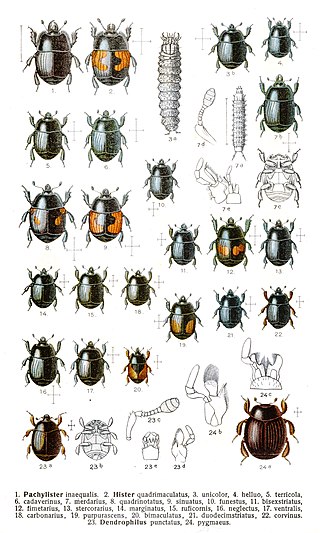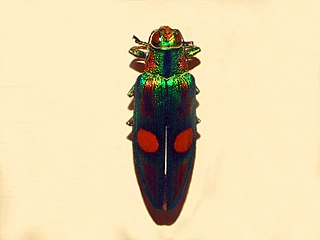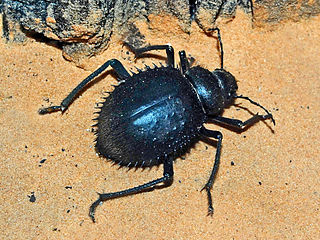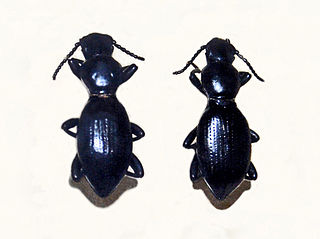
Darkling beetle is the common name for members of the beetle family Tenebrionidae. The number of species in the Tenebrionidae is estimated at more than 20,000 and the family is cosmopolitan in distribution.

Histeridae is a family of beetles commonly known as clown beetles or Hister beetles. This very diverse group of beetles contains 3,900 species found worldwide. They can be easily identified by their shortened elytra that leaves two of the seven tergites exposed, and their geniculate (elbowed) antennae with clubbed ends. These predatory feeders are most active at night and will fake death if they feel threatened. This family of beetles will occupy almost any kind of niche throughout the world. Hister beetles have proved useful during forensic investigations to help in time of death estimation. Also, certain species are used in the control of livestock pests that infest dung and to control houseflies. Because they are predacious and will even eat other Hister beetles, they must be isolated when collected.

The noble chafer is a species of beetles belonging to the family Scarabaeidae, subfamily Cetoniinae.

The Lymexylidae, also known as ship-timber beetles, are a family of wood-boring beetles. Lymexylidae belong to the suborder Polyphaga and are the sole member of the superfamily Lymexyloidea.

Tenebrioninae is the largest subfamily of the darkling beetles (Tenebrionidae), containing flour beetles, among others. Tenebrioninae contains more than 20 tribes.

Gonioctena fornicata is a species of broad-shouldered leaf beetles belonging to the family Chrysomelidae, subfamily Chrysomelinae.

Saperda punctata is a beetle species of flat-faced longhorns belonging to the family Cerambycidae, subfamily Lamiinae.

Chrysochroa ocellata is a Jewel Beetle or Metallic Wood-boring Beetle of the Buprestidae family.

Cryptocephalus trimaculatus is a species of cylindrical leaf beetle belonging to the family Chrysomelidae, subfamily Cryptocephalinae.

Morimus asper is a species of beetle in family Cerambycidae.

Zographus oculator, the Orange-eyed Long-horn Beetle, is a species of flat-faced longhorn beetles belonging to the family Cerambycidae.

Chlorophorus varius, the grape wood borer, is a species of beetle in the family Cerambycidae.

Pimelia angulata is a species of darkling beetles in the subfamily Pimeliinae.

Mesostena is a genus of darkling beetles in the subfamily Pimeliinae.

Asbolus verrucosus(LeConte, 1852), also known as the desert ironclad beetle or blue death feigning beetle, is a species of darkling beetle native to the deserts of the Southwestern United States, notably the Sonoran desert. It is highly adapted to hot environments and is omnivorous, consuming dead insects, fruits, lichen, and other plant matter. When threatened, the beetles are able to feign death. The species is becoming increasingly popular in the pet trade, due to their ease of care, hardiness, and longevity.

Glischrochilus hortensis is a species of beetle in the genus Glischrochilus of the family Nitidulidae. The genus are commonly known as 'sap-beetles'.

Phytoecia puncticollis is a species of beetle in the family Cerambycidae. It was described by Faldermann in 1837. It is known from Russia, Azerbaijan, Georgia, Iraq, Armenia, Turkey, Iran, and Turkmenistan. It feeds on Eryngium billardierei.

Mylabris variabilis is a species of blister beetle belonging to the Meloidae family.

Lamprolina is an Australian genus of leaf beetles (Chrysomelidae) found in Victoria, New South Wales, and Queensland.
Palimbolus elegans is a beetle in the Staphylinidae family, which is found in Tasmania.



















